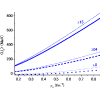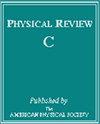Nucleon-quark mixed matter and neutron-star equation of state
IF 3.4
2区 物理与天体物理
Q1 Physics and Astronomy
引用次数: 0
Abstract
The nucleon-quark mixed matter is defined in the Brueckner-Hartree-Fock framework, in which quark densities are determined by equilibrium conditions between nucleon and quark chemical potentials, and nucleon-quark interactions play critical roles for resulting equations of state (EoSs). The two models of EoSs are derived from the nucleon-quark mixed matter (NQMM): The NQMM-A EoSs are based on the simple assumption that nucleons and free quarks occupy their respective Fermi levels and their Fermi spheres overlap from each other. In NQMM-B EoSs, the quark Fermi repulsion effect is incorporated on the basis of quarkyonic matter, meaning that the nucleon Fermi levels are pushed up from the quark Fermi sphere by the Pauli exclusion principle. For the NQMM-A EoSs, the neutron-star mass-radius curves are pushed up above the region of and km indicated by recent observations, as the repulsions increase. For the NQMM-B EoSs, similar results are obtained by the combined contributions from the repulsion and the quark Fermi repulsion. In both models of EoSs, the important roles of the diquark exchange repulsions are demonstrated to reproduce reasonable values of and .

核-夸克混合物质和中子星状态方程
核-夸克混合物质是在布鲁克纳-哈特里-福克(Brueckner-Hartree-Fock)框架中定义的,其中夸克密度由核-夸克化学势之间的平衡条件决定,核-夸克相互作用在由此产生的状态方程(EoSs)中起着关键作用。核-夸克混合物质(NQMM)衍生出两种 EoSs 模型:NQMM-A EoS 基于核子和自由夸克占据各自的费米级且费米球相互重叠的简单假设。在 NQMM-B EoSs 中,夸克费米斥力效应被纳入夸克物质的基础,这意味着核子费米级被保利排他原理从夸克费米球推高。对于 NQMM-A EoSs,随着 qN 斥力的增加,中子星质量-半径(MR)曲线被推高到最近观测结果表明的 M∼2.1M⊙ 和 R2.1M∼12.5 km 区域之上。对于 NQMM-B EoSs,qN斥力和夸克费米斥力的综合贡献也得到了类似的结果。在这两种EoS模型中,qN二夸克交换斥力的重要作用都得到了证明,从而再现了Mmax和R2.1M⊙的合理值。
本文章由计算机程序翻译,如有差异,请以英文原文为准。
求助全文
约1分钟内获得全文
求助全文
来源期刊

Physical Review C
物理-物理:核物理
CiteScore
5.70
自引率
35.50%
发文量
0
审稿时长
1-2 weeks
期刊介绍:
Physical Review C (PRC) is a leading journal in theoretical and experimental nuclear physics, publishing more than two-thirds of the research literature in the field.
PRC covers experimental and theoretical results in all aspects of nuclear physics, including:
Nucleon-nucleon interaction, few-body systems
Nuclear structure
Nuclear reactions
Relativistic nuclear collisions
Hadronic physics and QCD
Electroweak interaction, symmetries
Nuclear astrophysics
 求助内容:
求助内容: 应助结果提醒方式:
应助结果提醒方式:


